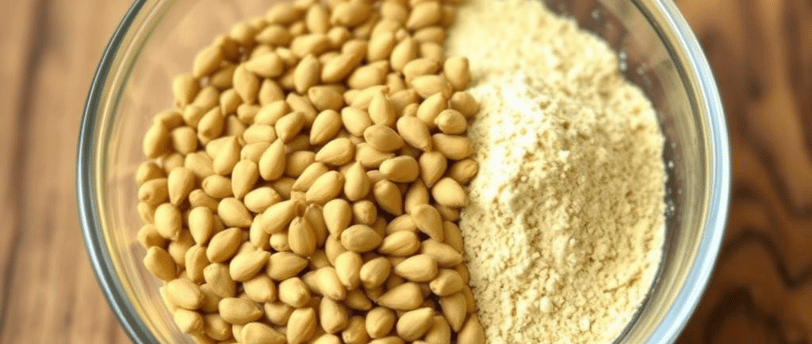Fenugreek for Heart Health: The Spice That Lowers Cholesterol and Supports Cardiovascular Wellness
❤️HEART HEALTH


Fenugreek, scientifically known as Trigonella foenum-graecum, is a herb that has been utilized for centuries both as a culinary spice and a traditional medicine. Emerging research suggests that fenugreek may play a significant role in promoting heart health, particularly in managing cholesterol levels. In this article, we will explore the various forms available, recipes, appropriate dosage, potential side effects, necessary precautions, and the scientific basis for fenugreek’s heart-healthy benefits.
Forms Available
Fenugreek is available in various forms, making it easy to incorporate into daily diets and health regimens. The most common forms include:
Seeds: Whole fenugreek seeds are commonly used in cooking. They are often roasted to enhance their nutty flavor before being added to dishes.
Powder: Fenugreek powder is made from grinding the seeds and can be added to recipes or taken as a supplement. This form is beneficial for those looking to utilize fenugreek for health purposes.
Teas: Fenugreek tea is prepared by steeping fenugreek seeds in hot water. This soothing beverage retains many of the beneficial properties of the seeds.
Capsules/Tablets: For those who prefer not to taste the herb, fenugreek supplements in capsule or tablet form are widely available. This is often the most convenient method for those taking fenugreek for specific health benefits.
Extracts: Fenugreek extracts offer concentrated forms of the beneficial compounds found in the seeds. These are often used in dietary supplements targeting health issues such as cholesterol management.
Recipes Using Fenugreek
Incorporating fenugreek into your diet can be delicious and easy. Here are a few recipes that showcase this remarkable spice:
1. Fenugreek Curry
Ingredients:
2 tablespoons fenugreek seeds
1 onion, chopped
2 tomatoes, chopped
1 teaspoon turmeric powder
1 teaspoon cumin powder
Salt to taste
2 cups spinach or other greens
2 tablespoons oil
Instructions:
Heat oil in a pan. Add fenugreek seeds and sauté until they start to pop.
Add chopped onions and fry until golden brown.
Stir in tomatoes, turmeric, cumin, and salt. Cook until tomatoes are softened.
Add the greens and cook until wilted. Serve with rice or bread.
2. Fenugreek Tea
Ingredients:
1 teaspoon fenugreek seeds
2 cups water
Honey or lemon (optional)
Instructions:
Boil the water in a pot and add fenugreek seeds. Simmer for 10-15 minutes.
Strain the mixture into a cup. Add honey or lemon for taste if desired.
3. Fenugreek and Yogurt Dip
Ingredients:
1 cup yogurt
1 tablespoon fenugreek powder
1 clove garlic, minced
1 tablespoon lemon juice
Salt and pepper to taste
Instructions:
In a bowl, combine yogurt, fenugreek powder, garlic, lemon juice, salt, and pepper.
Mix well and serve with vegetables or whole-grain crackers as a dip.
Dosage
The appropriate dosage of fenugreek can vary based on individual health goals and the form of fenugreek being used. Generally, recommendations include:
Seeds: 1-2 teaspoons of whole seeds or powder daily.
Tea: 1-2 cups brewed from about 1 teaspoon of seeds.
Capsules: 500 mg to 1 g, taken 1-3 times per day.
Extracts: 300-600 mg per day is commonly suggested.
It’s critical to consult with a healthcare provider before starting any new supplement regimen, especially if you have existing health conditions or medications.
Side Effects
While fenugreek is generally recognized as safe when consumed in food amounts, some individuals may experience side effects. Possible side effects include:
Gastrointestinal upset, including diarrhea and gas
Allergic reactions in sensitive individuals
A maple syrup-like scent in urine (a harmless effect)
Potential interactions with blood thinners and diabetes medications
Monitor your body's response, and discontinue use if adverse effects occur.
Precautions
When using fenugreek, consider the following precautions:
Pregnancy and Breastfeeding: Fenugreek is believed to stimulate uterine contractions, which could be a risk during pregnancy. It is essential for pregnant or breastfeeding women to consult a healthcare professional before using fenugreek supplements.
Diabetes: Fenugreek may lower blood sugar levels. Diabetic patients should monitor their levels closely when consuming fenugreek.
Surgery: Due to potential blood-thinning effects, it is advisable to discontinue fenugreek intake two weeks before any scheduled surgery.
Scientific Basis
Research into the cardiovascular benefits of fenugreek has demonstrated promising results. The key components of fenugreek, such as soluble fiber, saponins, and flavonoids, contribute to its cholesterol-lowering effects. According to a study published in the Journal of Nutrition, fenugreek supplementation can significantly reduce total cholesterol and low-density lipoprotein (LDL) cholesterol levels while increasing high-density lipoprotein (HDL) cholesterol in the blood.
Another study published in the American Journal of Clinical Nutrition indicated that regular consumption of fenugreek could improve insulin sensitivity, which plays a crucial role in heart health by managing weight and blood sugar levels.
Furthermore, fenugreek's anti-inflammatory and antioxidant properties help combat oxidative stress, a contributing factor to cardiovascular diseases. By reducing inflammation, fenugreek may support overall heart health and mitigate the risks associated with heart disease.
Conclusion
Fenugreek is more than just a flavorful spice; it is a powerhouse of health benefits, particularly for heart health. By understanding the various forms available, learning how to incorporate it into your diet through delicious recipes, and being aware of proper dosages and precautions, you can harness fenugreek's potential to lower cholesterol and support cardiovascular wellness. As with any dietary supplement, consultation with a healthcare professional is crucial to ensure safe and effective use. Embrace this unique herb as a step towards a healthier heart!
